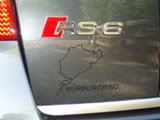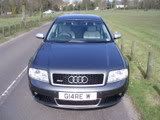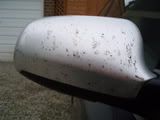Suspension
Suspension
After having my RS6 for 6 months now, and having ongoing suspension problems, I have had a closer look at the DRC system.
I did not realise that the DRC suspension has monotube dampers rather than twin tube.
I also found out that the Audi 'vacuum/filling tool' only pressures upto 5 bar.
Monotube dampers, by design, need at least 10 bar of pressure to stop cavitation behind the moving piston. The moment cavitation happens, the damper will pull in air from the outside through the damper seals. When monotube dampers have air mixed in with the damper oil, they will lose damping efficiency, especially noticable on high(ish) damper acceleration. This results in 'pattering' of the wheels over ridges and the concequent vibration through the car and the throttle pedal. It also means that the car loses grip much faster in many instances, as the wheel has less contact with the road.
So, it is quite clear that when the system is opened up for whatever reason, the pre-pressurised, valves need to be replaced. Purely because the valves are pre-pressurised to 16 bar, allowing the dampers to work as they were designed to operate.
Re-filling to 5 bar without replacing the valves is of no real use as the dampers are not able to work correctly.
Cheers
I did not realise that the DRC suspension has monotube dampers rather than twin tube.
I also found out that the Audi 'vacuum/filling tool' only pressures upto 5 bar.
Monotube dampers, by design, need at least 10 bar of pressure to stop cavitation behind the moving piston. The moment cavitation happens, the damper will pull in air from the outside through the damper seals. When monotube dampers have air mixed in with the damper oil, they will lose damping efficiency, especially noticable on high(ish) damper acceleration. This results in 'pattering' of the wheels over ridges and the concequent vibration through the car and the throttle pedal. It also means that the car loses grip much faster in many instances, as the wheel has less contact with the road.
So, it is quite clear that when the system is opened up for whatever reason, the pre-pressurised, valves need to be replaced. Purely because the valves are pre-pressurised to 16 bar, allowing the dampers to work as they were designed to operate.
Re-filling to 5 bar without replacing the valves is of no real use as the dampers are not able to work correctly.
Cheers
I'm surprised no-one has picked up on this post - where are you technicians out there??
If this is correct then it would imply that any dealer trying to repressure the system is on a loser. Anyone able to verify that the tool can only do 5 bar?
Is there a reading one can take on Vag-com that lets you know what the pressure in the system is?
Dave
If this is correct then it would imply that any dealer trying to repressure the system is on a loser. Anyone able to verify that the tool can only do 5 bar?
Is there a reading one can take on Vag-com that lets you know what the pressure in the system is?
Dave
As we're on this topic.
Only having the car for 6ish weeks how noticeable are the symptoms for failure?
As far as I'm concerned the car drives well but other than two shortish test drives i can't compare.
I know the car is a beast on weight and size and didnt expect it to drive like a smaller 4x4 car but is there some thing that gives the game away that will make me aware of a problem.
I'm expecting you to say "when it's gone, you'll know! ! !" but you can only ask.
thanks
Only having the car for 6ish weeks how noticeable are the symptoms for failure?
As far as I'm concerned the car drives well but other than two shortish test drives i can't compare.
I know the car is a beast on weight and size and didnt expect it to drive like a smaller 4x4 car but is there some thing that gives the game away that will make me aware of a problem.
I'm expecting you to say "when it's gone, you'll know! ! !" but you can only ask.
thanks



Once monotube dampers have run on too low a pressure and have cavitated, they will have 'sucked in' air through the seals. This seems to result in the dampers spitting out some damper oil during high spindle acceleration.
If the dampers have too low a pressure in them a few characteristics will be displayed:
'pattering' over ridges and short undulations, sometimes to the extent that the back end of the car moves sideways.
'diagonal pitching' in corners with long undulations
vibrations though the throttle pedal over ridges and short undulations
ESP and ABS kicking in earlier
Increased tyre wear
Slightly loose feeling in the steering over ridges and short undulations.
I am sure I have missed some things out.............
I would expect these are the things most of the RS6 owners are experiencing?
Cheers
If the dampers have too low a pressure in them a few characteristics will be displayed:
'pattering' over ridges and short undulations, sometimes to the extent that the back end of the car moves sideways.
'diagonal pitching' in corners with long undulations
vibrations though the throttle pedal over ridges and short undulations
ESP and ABS kicking in earlier
Increased tyre wear
Slightly loose feeling in the steering over ridges and short undulations.
I am sure I have missed some things out.............
I would expect these are the things most of the RS6 owners are experiencing?
Cheers
Roll pitch and yaw are the three axes for rotation: roll is rotation about the fore-aft axis; pitch is about the side to side axis (ie its front to back rocking), and yaw is about a verticle axis (what you get when you skid).
When the dampers have gone certain bumps make the car feel as if it just "stepped out of line"
Hope that helps!
There, if you had only asked last week I could have said come round and have a ride - but mine is now fixed (thanks to Camberley Audi) and the drive is transformed
Cheers
Dave
When the dampers have gone certain bumps make the car feel as if it just "stepped out of line"
Hope that helps!
There, if you had only asked last week I could have said come round and have a ride - but mine is now fixed (thanks to Camberley Audi) and the drive is transformed
Cheers
Dave
Fwiw, I had to go to battle with my dealer to get them to replace the central accumulators after replacing both front shocks. Initially they returned the car after damper replacement only, and all of the comments offered by jobq applied. It took me two months of haggling and finally the submission of an Audi guide for RS6 techs to get them to change the accumulators. Here is the link for the guide - it may come in handy for many reasons, and is certainly worth reading anyway: http://academy.accessaudi.com/files/SSPs/991303_RS6.pdf
Thanks Dave,Daveperc wrote:Roll pitch and yaw are the three axes for rotation: roll is rotation about the fore-aft axis; pitch is about the side to side axis (ie its front to back rocking), and yaw is about a verticle axis (what you get when you skid).
When the dampers have gone certain bumps make the car feel as if it just "stepped out of line"
Hope that helps!
There, if you had only asked last week I could have said come round and have a ride - but mine is now fixed (thanks to Camberley Audi) and the drive is transformed
Cheers
Dave
Glad you made it to Camberley, used them once and have had several conversations by phone but they have come out with top marks so far.
Cars back in again in a couple of weeks for bits but I'm sure they will do a fantastic job again.
I deal with a Rob, nice guy that gives you the time of day.



Hi,
Just some more useless information. The reason why our DRC shocks are starting to leak is that the top seals are designed to keep the oil from passing when under pressure. When the pressure in the damper drops, the efficiency of the seals drops. So in short, the higher the constant pressure, the better the seals work.
Next time I am in Germany, I will put the car on one of the new TUV test lanes that also check shock efficiency. I am pretty convinced that pressurised to 5 bar, it won't pass TUV or OE standards.
I am sorry to keep going about this subject, but the difference between a RS6 that has it's suspension fitted correctly and one running on low pressure is immense. Compliance, control and precision suddenly appear when the APA/Kayaba DRC system is working as it was designed.
The new RS4 runs the same design. I wonder what the future will bring for them.........
Cheers
Just some more useless information. The reason why our DRC shocks are starting to leak is that the top seals are designed to keep the oil from passing when under pressure. When the pressure in the damper drops, the efficiency of the seals drops. So in short, the higher the constant pressure, the better the seals work.
Next time I am in Germany, I will put the car on one of the new TUV test lanes that also check shock efficiency. I am pretty convinced that pressurised to 5 bar, it won't pass TUV or OE standards.
I am sorry to keep going about this subject, but the difference between a RS6 that has it's suspension fitted correctly and one running on low pressure is immense. Compliance, control and precision suddenly appear when the APA/Kayaba DRC system is working as it was designed.
The new RS4 runs the same design. I wonder what the future will bring for them.........
Cheers
I have often wondered if there is a way of measuring suspension performance in the UK instead of a very subjective test drive... far better to get factual data that subjective opinion.
I once saw a Porsche suspension development clip, effectively the car sat on 4 metal squares that move rapidly in a vertical motion and the reaction of the suspension is measured. I would gladly pay a couple of hundred for this service.
I once saw a Porsche suspension development clip, effectively the car sat on 4 metal squares that move rapidly in a vertical motion and the reaction of the suspension is measured. I would gladly pay a couple of hundred for this service.
Present:...
Lotus Evora GT410 Sport, Caterham 420R, CCM Spitfire, VW T2 Bay Window 1976
Past:
DB11 AMR, 992, 991.2, Yamaha MT01, 640d Gran Coupe, 635d Coupe, RS6 C5, Audi TT 225 Coupe, Astra with wind up windows, Citroen ZX, Rover 213, yes behold, a Rover 213... Renault 5
Lotus Evora GT410 Sport, Caterham 420R, CCM Spitfire, VW T2 Bay Window 1976
Past:
DB11 AMR, 992, 991.2, Yamaha MT01, 640d Gran Coupe, 635d Coupe, RS6 C5, Audi TT 225 Coupe, Astra with wind up windows, Citroen ZX, Rover 213, yes behold, a Rover 213... Renault 5
Rather than start a new thread.jobg wrote:
vibrations though the throttle pedal over ridges and short undulations
Since reading jobg's comment above I've noticed several times this very thing.
Driving the car seems to be fine but now I'm nervous on the above comment.
Does anyone else sometimes feel a vibration on the throttle pedal but know it's OK and quite normal?
Thanks



Who is online
Users browsing this forum: No registered users and 211 guests